
One Malicious Act Could Destroy Every Satellite We Have
Share
In 2021, a significant event took place in space that raised concerns about the safety of our satellites and space activities. Russia deliberately fired a missile at one of its own old military satellites, causing it to break apart into numerous fragments. This event sent shockwaves through the international space community.
The resulting debris from the satellite explosion posed a severe threat to other satellites and spacecraft in orbit. The pieces of debris, both large and small, started floating around Earth at incredibly high speeds, posing a significant risk of collisions. This situation has implications for future space missions and our reliance on satellite technology.

Scientists and experts have been studying the issue of space debris for some time. They have discovered that there are already thousands of satellites orbiting Earth, along with millions of smaller debris pieces ranging from 1 millimetre to 10 centimetres in size. Even a small fragment travelling at such high velocities can cause substantial damage to valuable space equipment.
The testing of anti-satellite weapons has further exacerbated the problem. Several countries, including Russia, China, the United States, and India, have conducted tests to destroy satellites using various methods. These tests generate even more debris, adding to the growing space junk population and increasing the risk of collisions.
The concern is that if we do not address this issue, the amount of space debris will continue to escalate. This could lead to a dangerous phenomenon known as the Kessler syndrome. The Kessler syndrome occurs when collisions between existing debris create a chain reaction, generating even more fragments and making certain orbits too hazardous for satellites. This scenario could severely impact our ability to use and launch new satellites, jeopardising crucial services such as communication, weather monitoring, and navigation.
Recognizing the gravity of the situation, the United States has taken a significant step by declaring an end to the testing of anti-satellite weapons in space. They aim to set an example for other nations to follow, promoting responsible behaviour and reducing the risks associated with space debris.

Addressing the challenges posed by space debris requires international cooperation and responsible space practices. It is vital for countries to work together to develop strategies for debris mitigation, such as removing defunct satellites and implementing measures to prevent further collisions. Additionally, advancements in tracking technology and increased transparency regarding space activities can contribute to better monitoring and management of space debris.
Protecting the space environment is crucial for the future of space exploration and the many essential services satellites provide us with. By fostering international collaboration and responsible space practices, we can ensure the sustainability and safety of space activities for generations to come.
ARSE Jnr
The section where we explain the above to 5-year-olds (and Flat Earthers).
A few years ago, a country called Russia shot a missile at one of their old satellites. It broke into many pieces and created lots of debris floating around in space. This debris is like tiny rocks that can bump into other satellites and spaceships.
There are already many satellites and space junk floating around Earth. These things help us with important tasks like talking on the phone, watching TV, and knowing what the weather will be like. But when the debris from the broken satellite crashes into other things, it can cause big problems.
Scientists are worried because if we don't do something, it could get even worse. All the debris crashing into each other could make space a very dangerous place for satellites. It could even stop us from sending new satellites into space.
But don't worry, some countries, like the United States, are trying to solve this problem. They want everyone to stop testing weapons in space and work together to keep space safe. They want to clean up the debris and make sure our satellites can keep working properly.
It's important for everyone to be responsible and take care of space. By working together and being careful, we can make sure that space stays a safe and exciting place for exploration.
You’ve come this far…
Why not venture a little further into A.S.S. - our exclusive Australian Space Society.
And keep thrusting Australia into the deep unknown…
#Space_Aus




